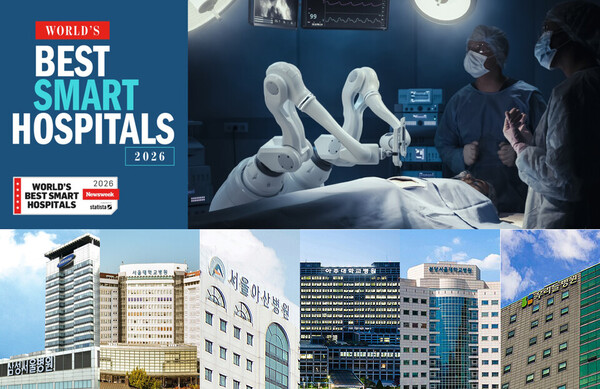Seventeen Korean hospitals were selected as the world’s Best Smart Hospitals.
Samsung Medical Center (SMC) retained its top spot in Korea for the fifth consecutive year and climbed three places in the global rankings. The world's top smart hospital was the Mayo Clinic in the United States.

Newsweek, the U.S. magazine, recently announced the “World's Best Smart Hospitals 2026” in collaboration with global market research firm Statista. The list features 350 hospitals from 30 countries leading the implementation of new medical technologies. This marks the fifth year of the World's Best Smart Hospitals evaluation.
The evaluation was conducted by compiling recommendations for hospitals leading in electronic functionalities, telemedicine, artificial intelligence, robotics, virtualization, and patient safety technologies, along with a survey involving over 6,000 hospital administrators and medical professionals worldwide, as well as the Statista Smart Hospitals Maturity Survey and JCI (Joint Commission International) accreditation results.
The final evaluation was calculated by applying weights of reputation (77.5 percent), maturity survey (20 percent), and JCI accreditation (2.5 percent). Hospitals whose innovation and leadership were verified through an additional literature review were included in the rankings.
SMC named Korea's top smart hospital for five consecutive years, rising to 15th globally
Korea saw 17 hospitals selected as the World's Best Smart Hospitals, two more than last year. It also ranked as the country with the most hospitals in Asia within the top 350. Six Korean hospitals made it into the world's top 100 smart hospitals. Notably, the Big Four—SMC, Seoul National University Hospital (SNUH), Asan Medical Center (AMC), and Severance Hospital—were all praised for their excellence in “patient safety technology.”
SMC was selected as Korea's smartest hospital for the fifth consecutive year. It was praised for its excellence in AI, patient safety technology, and telemedicine. Its global ranking also rose three spots to 15th place.
SNUH ranked second nationally and 51st globally. SNUH was recognized for excellence in AI and patient safety technology, climbing nine spots from last year (60th globally). AMC followed at 55th globally, recognized for excellence in AI, patient safety technology, and telemedicine. It rose 10 places from last year (65th globally).
Following the Big Four were Ajou University Hospital (81st), Seoul National University Bundang Hospital (88th), and Wooridle Hospital (90th), which also made the top 100 global smart hospitals. Severance Hospital ranked 109th globally, with digital capabilities, patient safety technology, and virtualization recognized as its strengths. Gachon University Gil Medical Center (318th) and Korea University Guro Hospital (346th) entered the rankings for the first time this year.
Mayo Clinic reclaims World's Top Smart Hospital title
The world's top smart hospital was the Mayo Clinic in the United States. Mayo Clinic reclaimed the top spot it had ceded to Cleveland Clinic last year, securing first place for the fourth time in five evaluations.
Cleveland Clinic ranked second, followed by Massachusetts General Hospital in third, Johns Hopkins Hospital in fourth, Mount Sinai Hospital in fifth, MD Anderson Cancer Center in sixth, and Memorial Sloan Kettering Cancer Center in seventh, all U.S. hospitals.
At eighth place was Charité-Universitätsmedizin Berlin in Germany, ninth was Sheba Medical Center in Israel, and 10th was Houston Methodist Hospital in the U.S.
The country with the most hospitals selected as the world's best smart hospitals was the United States with 103, followed by Germany with 24, the United Kingdom with 22, France with 20, Italy with 18, Korea with 17, Spain with 16, Canada with 13, Switzerland with 12, Japan with 10, Singapore with 10, the Netherlands with seven, and the United Arab Emirates (UAE) with seven.
Related articles
- Despite struggles in Korea, pediatrics and urology earn top global rankings
- National university hospitals mark huge deficit in H1 due to Yoon’s reckless policies
- Telemedicine stays after healthcare crisis, but key restrictions return
- SNUH researchers identify new biomarker for early diagnosis of pediatric moyamoya disease
- SMC to host 1st Thoracic Tumor Symposium to advance multidisciplinary collaboration

